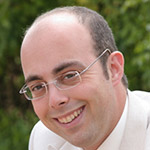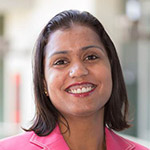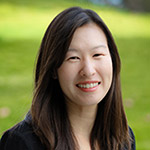
By:
- Inga Kiderra
- Ioana Patringenaru
Published Date
By:
- Inga Kiderra
- Ioana Patringenaru
Share This:
Five UC San Diego Researchers Receive Prestigious Sloan Fellowships
Five UC San Diego faculty members are being honored by the Alfred P. Sloan Foundation with Sloan Research Fellowships for 2015—three from the Jacobs School of Engineering and two from the Division of Social Sciences. This year’s recipients are computer scientist Shachar Lovett, economist Paul Niehaus, Padmini Rangamani from the department of mechanical and aerospace engineering, nanoengineer Andrea Tao and neuroscientist Bradley Voytek.
The fellowships seek to boost fundamental research by early-career scientists and scholars of outstanding promise. The two-year awards go to 126 researchers yearly in recognition of distinguished performance and a unique potential to make substantial contributions to their field.
“Their achievements and potential place them among the next generation of scientific leaders in the U.S. and Canada,” noted the Foundation in a full-page New York Times advertisement, adding that since 1955, “Sloan Research Fellows have gone on to win 43 Nobel Prizes, 16 Fields Medal, 65 National Medals of Science” and numerous other honors.

Shachar Lovett, Department of Computer Science and Engineering
Lovett is an expert in computational complexity. He studies the foundations of computer science and how computational problems can be efficiently solved. “As the scientific, engineering and life sciences communities continue to be transformed by new, ever larger data sets, the motivation for designing very efficient algorithms to manipulate, store and transfer data is becoming ever more clear,” said Lovett in his research statement to the Foundation. “Specifically, I study how the interplay between structure and randomness plays a central role in algorithm design and analysis.”

Paul Niehaus, Department of Economics
Niehaus is an economist whose research interests focus on issues in developing countries and on social learning processes. His recent UC San Diego projects involve working with governments in India to improve the implementation of social programming there. Named one of Foreign Policy’s leading 100 “Global Thinkers” in 2013, Niehaus is co-founder and president of the nonprofit GiveDirectly.org, which aims to reshape international giving through technology-enabled cash transfers to the extremely poor. “I believe we should be putting more money and more power directly into the hands of the poor,” he says. “When given the chance, they have a consistent track record, across dozens of rigorous studies, of using money sensibly to improve their own lives.”

Padmini Rangamani, Department of Mechanical and Aerospace Engineering
Rangamani’s work lies at the intersection of computational and evolutionary molecular biology. She has a unique perspective on these issues: she holds a doctorate in biology and master’s and bachelor’s degrees in chemical engineering. “We need to keep the conversation going between physicians and engineers,” she said. Here at UC San Diego, she is partnering with several researchers at the School of Medicine to examine how a particular protein affects cells responsible for aging and heart disease. The ultimate goal is to find mechanisms that could lead to better drugs. “If we want effective treatments, we need to understand how cells behave,” Rangamani said. “There are a lot of forces and mechanical principles at work, in addition to chemistry. If we can target cells better, we can design therapeutics better.”

Andrea Tao, Department of NanoEngineering
Tao’s research brings together materials science, chemistry and biology. She is investigating nanoparticle synthesis and assembly for the fabrication of advanced nanoscale composites. “A critical need in nanotechnology is the development of new tools and methods to organize, connect and integrate solid-state nanocomponents,” Tao explains. “We are developing new chemical and simulations tools for self-assembly—where components spontaneously organize themselves—to construct large-scale architectures using solid-state nanocrystal building blocks.” Applications for her research include photovoltaics, chemical sensing and optical coatings.

Bradley Voytek, Department of Cognitive Science
Voytek’s research program combines large scale data-mining and machine-learning techniques with experimental research to understand the relationships between the human frontal lobes, cognition and disease. Specifically, he has been studying the role that neuronal oscillations play in human cognition, with a focus on neuroplasticity and network communication. He is also one of the world’s top experts on the zombie brain. “Using satire to teach real science”—zombies suffer from Consciousness Deficit Hypoactivity Disorder, he claims—Voytek is a skilled public speaker who has found a pop-culture hook to help the public engage with neuroscience.
For the full list of this year’s Sloan fellows: click here.
Share This:
You May Also Like
Stay in the Know
Keep up with all the latest from UC San Diego. Subscribe to the newsletter today.


